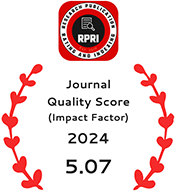Synergistic Efficiency Between Types of Fungi and Algae for Wastewater Treatment
DOI:
https://doi.org/10.55544/jrasb.1.4.26Keywords:
Phosphate, removal, Molecular, Diagnostics, FungiAbstract
The study aims to demonstrate the efficiency of the synergy between types of fungi and algae for wastewater treatment. Samples are collected from the waters of Wadi al-Kharazi inside the University of Mosul. Four genera of organisms, two sexes of fungi, and two sexes of algae are used for the purpose of reacting.
Examinations are conducted for water treated with fungi and algae, as 8 treatments are used compared to the control treatment that contains water alone. The pH function, bicarbonate ions, and sulfates with the two elements iron and copper are measured.
The results of the bicarbonate examination show that the best biological treatment is in the mixed culturing of the alga Spirogyra maxima and the fungus Trichoderma asperallum. The average concentration during the incubation periods is 162.8 mg.l-1 compared to the average control treatment ranging 204.9 mg.l-1. The results of the sulfate examination show a decrease in concentration for all treatments compared to the control treatment. The best biological treatment in the mixed culturing is between the alga Spirogyra maxima and the fungus Mucor racemosus, as the removal rate reached 48% compared to the average of the control treatment. Examinations have demonstrated the synergy between fungi and algae in increasing the efficiency of pollutant removal rather than using both separately.
Downloads
References
Ibrahim, M. A. A. (2022). Evaluation of the performance of three liquefaction plants in the left city of Mosul / Nineveh and the identification of algae species in water. Ph.D. dissertation, College of Education, University of Mosul.
Salman, J. M.; Hassan, F. M. and Saleh, M. M. (2010). An environmental study of the use of aquatic organisms as life guides for the pollution of the Euphrates River with heavy metals. The Iraqi Journal of Market Research and Consumer Protection, 2 (3): 167-144.
Al-Sinjari, W. E. A. (2013). Assessment of water quality and the effect of self-purification in the water of Wadi Al-Kharazi / Mosul city. Master’s thesis. College of Education, University of Mosul.
Al-Safawi, A. Y. T. (2007). A study of the quantity and quality of liquid waste from the city of Mosul and its impact on the water quality of the Tigris River, Proceedings of the first scientific conference of the Center for Environmental Research and Pollution Control, University of Mosul 5-6 June: 1-10.
Al-Safawi, A. Y. and Al-Sardar, N. M. S. (2013). The possibility of using some physical and biological methods to improve the quality of well water, acceptable for publication in the Journal of Education and Science.
Al-Tai, Y. A. ( 2021). Using Mathematical Models to Evaluate Groundwater Quality for Various Purposes in Southeast Mosul, Master Thesis, College of Education for Pure Sciences, University of Mosul.
Abaya, L. M., Wiegner, T. N., Colbert, S. L., Beets, J. P., Kaile'a, M. C., Kramer, K. L., ... & Couch, C. S. (2018). A multi-indicator approach for identifying shoreline sewage pollution hotspots adjacent to coral reefs. Marine pollution bulletin, 129(1), 70-80.
Jakovljević, V. D., & Vrvić, M. M. (2016). Capacity of Aspergillus niger to degrade anionic surfactants and coproduce the detergent compatible enzymes. Applied Biochemistry and Microbiology, 52(2), 183-189.06:51.
Manhan, S.E. (2004) " Environmental chemistry ". 8th ed., CRC press Washington DC. USA. 781.06:50
Roa, D.V. (2012). Algae Biofule for wastewater treatment. http://environicspt.com/us/wpcontent/uploads/2012/08/Roa_Algae
Sankaran, S., Khanal, S. K., Jasti, N., Jin, B., Pometto III, A. L., & Van Leeuwen, J. H. (2010). Use of filamentous fungi for wastewater treatment and production of high value fungal byproducts: a review. Critical reviews in environmental science and technology, 40(5), 400-449.
Verma, A., Singh, H., Anwar, S., Chattopadhyay, A., Tiwari, K. K., Kaur, S., & Dhilon, G. S. (2017). Microbial keratinases: industrial enzymes with waste management potential. Critical reviews in biotechnology, 37(4), 476-491.
Ahmed, B. E.; Badawi, M. H.; Mostafa, S. S. and Higazy, A. M. (2018). Human Anticancers and Antidiabetic Activities of the cyanobacterium Fischrlla sp. BS1-EG Isolated from River Nile, Egypt. International journal of current Microbiology and Applied sciences, 7(1): 3473-3485.
Wong, J.P.; Wong, Y.S. and Tam, N.F. (2000). Nickel biosorption by two chlorella species, C. vulgaris (a commercial species) and C. miniata (a local isolate). Journal of Bioresource technology, 73: 133-137.
Falch, B. F.; Konig, G. M.; Wright, A. D.; Argehofer, C. K.; Pezzuto, J. M. and Bachman, H. (1995). Bioligical activites of cyanobacteria: evaluation extracts and pure compound. Planta Med., 61: 321- 328
APHA (American puplic Health Association) (1998) standard methods for the Examination of water and waste water washgton DC, U.S.A, pp.594-610.18th,Ed.
APHA, A. WPCF, 1985, Azide modification to iodo-metric method for dissolved oxygen determination, Setion 421b. Standard methods for the examination of water and wastewater, 16th ed., American public Health Association, Washington, DC, 418-19.
APHA, AWWA and WCPE (2017). Stand Method for Examination of water and wastewater American public Health Association, 23RD ed., Washington DC, USA.
Downloads
Published
How to Cite
Issue
Section
License
Copyright (c) 2022 Wassein Jassim Al-Juburi, Mohammad Ibrahim Khalil, Mira Ausamam Al-Katib

This work is licensed under a Creative Commons Attribution-NonCommercial-NoDerivatives 4.0 International License.


















